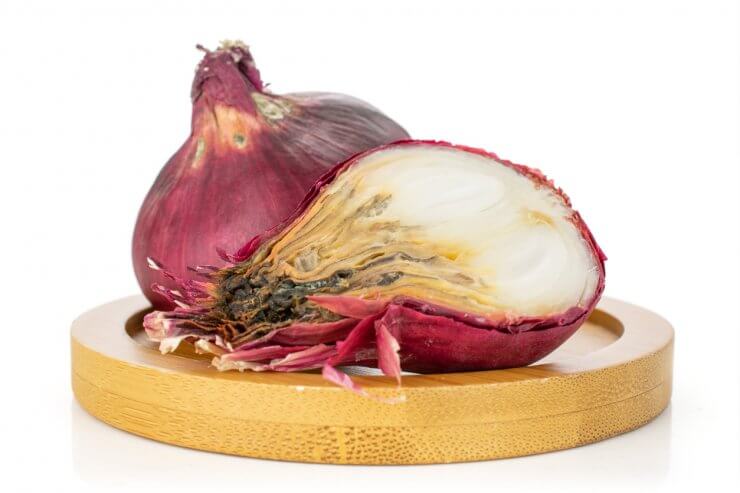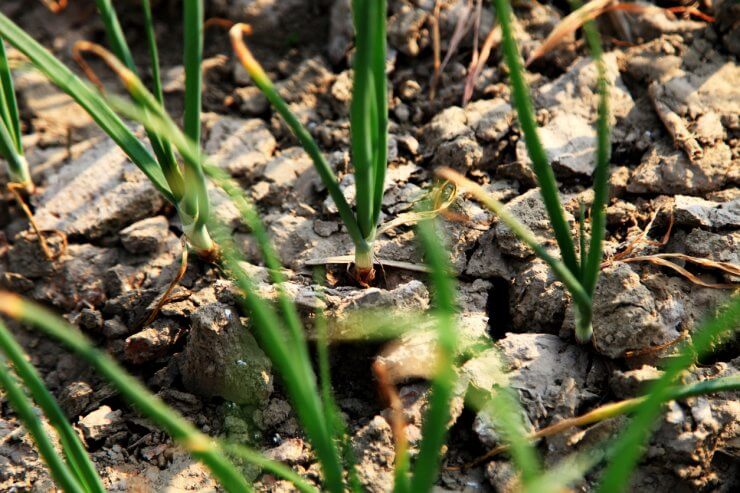
Sick onion
Onion plant diseases are caused by bacteria, fungi, and viruses. The diseases can spread through the soil, water, air, infected tools, animals, and even gardeners themselves.
Spot diseases on your onion plants sooner so you can treat plants before they are destroyed by disease and can successfully manage symptoms. Here is a three-step approach to keeping vigilant about the presence of onion plant diseases:
- Research the Risks. Find out about onion diseases that are prevalent in your geographic area. When possible, buy disease-resistant onion plant varieties to avoid diseases in the first place—many onion varieties have been specifically designed to resist certain diseases.
- Examine Plants Daily. Check your onion plants every day to be sure no disease symptoms are present or emerging.
- Spot Diseases Early. Catch and treat disease quickly so your plants can recover and thrive.
- powdery white growth
- yellow, stunted leaves
- scales on the neck turn soft and discolored
- water-soaked lesions
- fluffy white fungal growth
- water-soaked lesions
Onion diseases can affect the stem/neck, bulb, and roots. Here is what to look for to spot possible infection:
Onion leaves—possible disease symptoms:
Onion stem/neck—possible disease symptoms:
Onion bulb/roots—possible disease symptoms:
You can make your own natural disease and pest control spray with benign materials. Mix one tablespoon of baking soda, 1/2 teaspoon of a mild dish detergent, and 2 1/2 tablespoons of olive oil in a gallon of water to make a solution that will repel all kinds of bugs, as well as a fungicide for blight and mildew on the onion plant leaves. Shake it well in your bottle before spraying and repeat every week for it to be continuously effective.
We’re believers in not using toxic materials in the garden—they can hurt the plants, hurt the soil, damage the environment, and harm you.
Preventive measures to avoid onion plant diseases
Try some of these techniques for avoiding onion diseases in the first place:
Choose planting location carefully

Onions in the ground
Avoid planting onion where you have previously planted crops such as beans, peas, tulips, potatoes, leeks, chicory, strawberries, cucumbers, beets, celery, spinach, lettuce, or other onions. They are susceptible to the same diseases and many bacteria, fungi, and viruses live in the soil for years, just waiting to prey on your onion plants!
Avoid planting the same crops nearby, as having them in the area could facilitate rapid spread of any developing disease.
Some gardeners have had success planting onions near spinach, lettuce, and strawberries. But know that you run the risk of your onions falling prey to nematodes if you do choose these as companion plants.
And in the interest of good soil health practice, it’s a good idea to give an area a rest from onions for three to four years before you plant onions there again. If you have raised beds or containers, you could replace the soil if you’re really focused on onions for the next growing season.
Improve your soil composition
Before planting your onions, add a good amount of compost or organic matter to improve the soil. Sufficient nutrients and good aeration help grow stronger plants that will resist disease and infection.
Plant disease-resistant onion varieties
Many onion varieties have been developed specifically to resist particular onion diseases. You can plant disease-resistant onion varieties to always have the healthiest plants and harvest.
Water your garden properly
Don’t underwater or overwater your onion plants. By keeping a regular watering schedule, you’ll keep your plants vibrant and healthy. Overwatering and watering directly on the plants—instead of the preferred watering method, directly on the soil—leads to consistently wet conditions, which allows bacteria, fungi, and viruses to thrive and multiply.
Destroy infected plants
Throw away or burn infected plants. Don’t keep infected plants over the winter in your garden, and don’t throw them on your compost pile. Disease-ridden plants, even when dead, will spread the disease to other plants or even your soil.
Have you had problems with diseases attacking your onion plants? What types of problems do you regularly face with your onion plants? Please tell us how you treat and prevent diseases from destroying your onion crop.


 Previous
Previous

